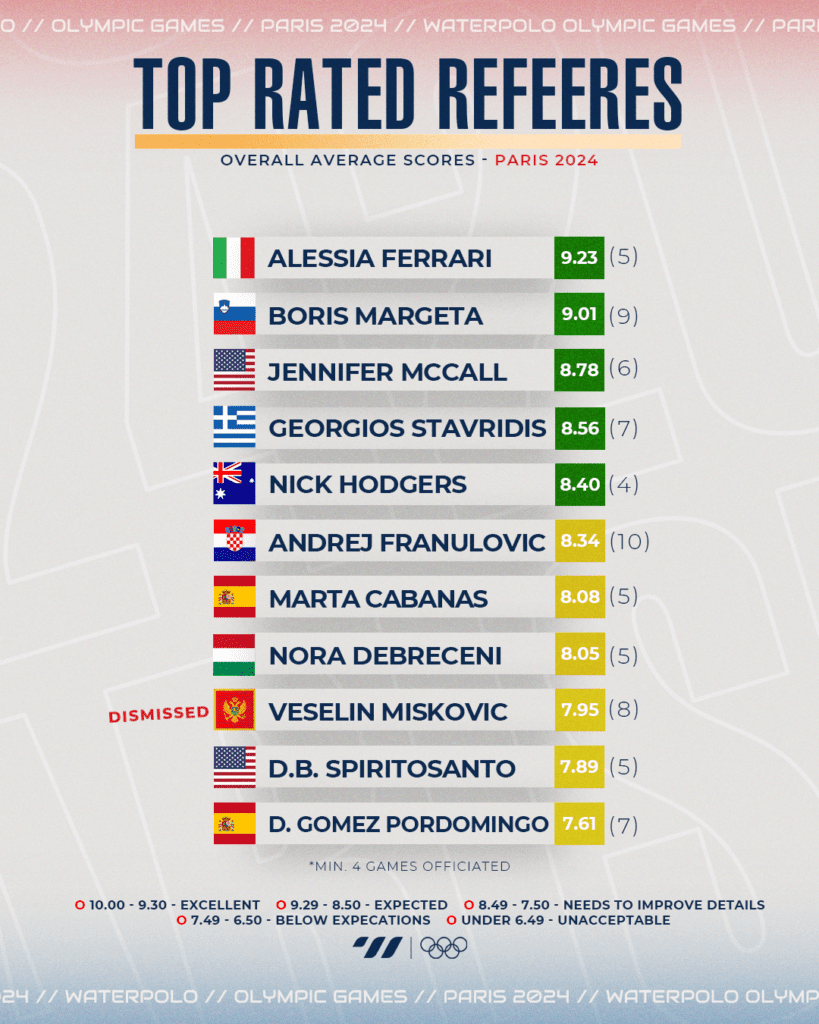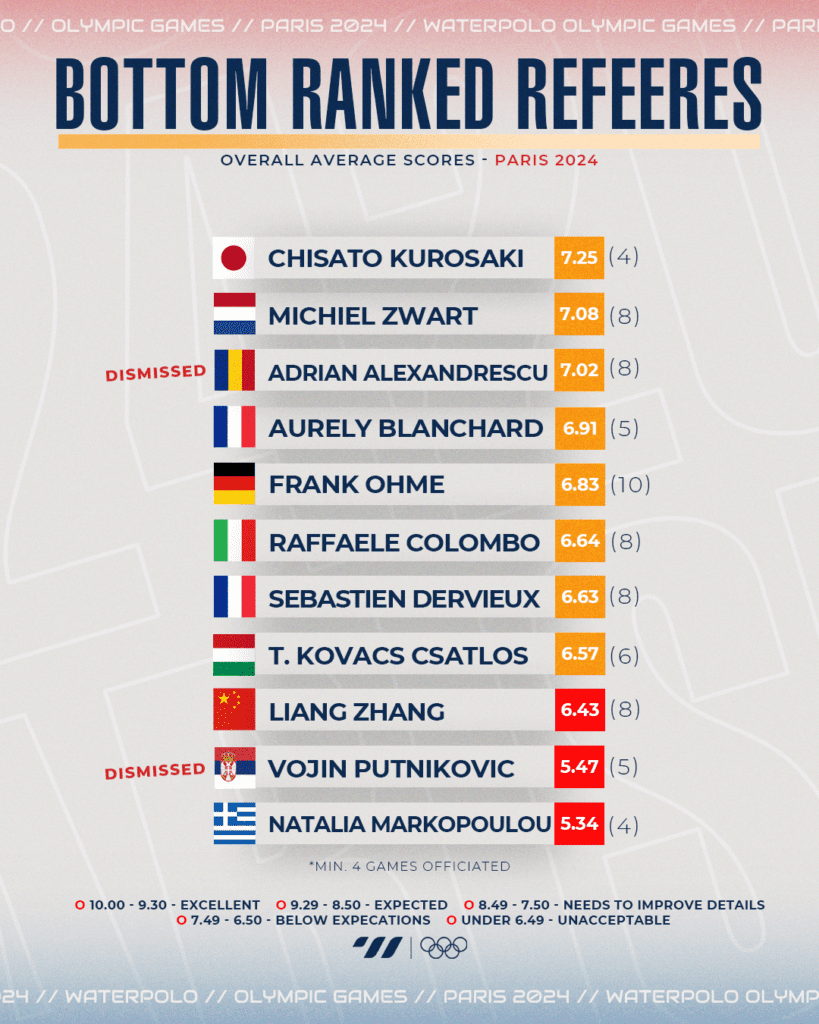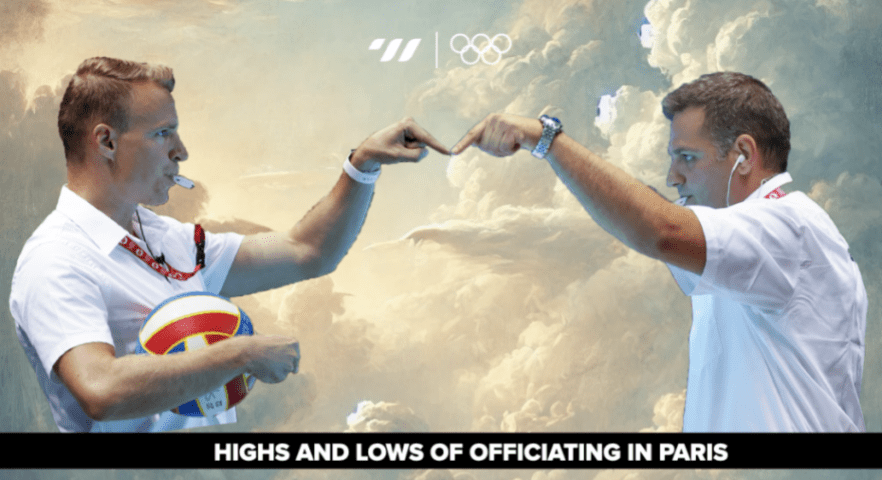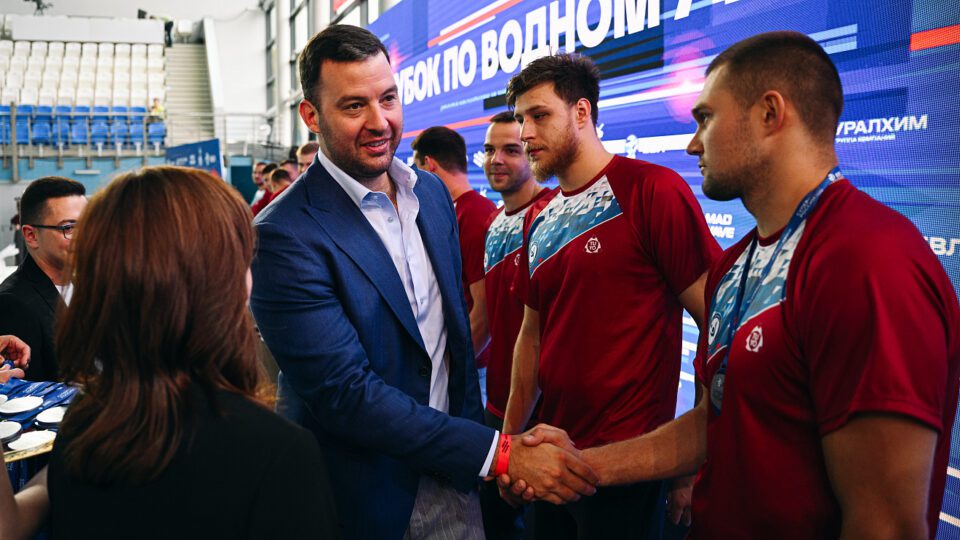The recently concluded water polo tournament in Paris brought forth not just thrilling matches but also a spotlight on the officiating, which has always been a critical component of the sport. As promised at the beginning of the competition, Total Waterpolo assembled a panel of referees and delegates with international experience to closely monitor the performances of the officials. Their task was to identify and rate refereeing errors in each game, and the results offer a revealing (maybe alarming) picture of the state of officiating in the sport today.
Methodology: Measuring Errors
As we mentioned at the beginning of the tournament, we brought together a panel of referees and delegates with international experience to monitor the matches and identify any refereeing errors observed during the games. Each match was reviewed by at least 10 members of the panel, and we recorded and published the average score for every match.
The evaluation method started with each referee being given a score of 10, from which points were deducted for each error made. Different types of mistakes carried different negative values. Overall, we tracked 20 different types of errors, depending on the nature of the mistake and the context in which it occurred. While we won’t be disclosing the specific types and values of these errors—since there are professionals in water polo dedicated to this field—it’s important to note that this methodology was applied consistently across all matches in both the men’s and women’s tournaments in Paris.
Five Referees Rated as Excellent
Despite the overall mixed reviews, five referees stood out with consistently high ratings. Alessia Ferrari, who officiated five matches in the women’s tournament, emerged as the top performer with an impressive average score – 9.23. Her assignments included three group matches, the Australia-Greece quarterfinal (9.55), and the Netherlands-Spain semifinal (9.25). Curiously, Ferrari was not selected for the final day of the women’s tournament, a decision that raises questions, especially when compared to the appointment of the lowest-rated referee, Markopoulou, for the 5th-place match, where she received a dismal 4.80.

Boris Margeta, who officiated nine matches (two in the women’s tournament and seven in the men’s), also excelled with an average score of 9.01. Notably, Margeta refereed the men’s final between Serbia and Croatia, earning an 8.65, while his partner Zwart received a much lower 6.90, close to his tournament average of 7.08.
Other referees like Jennifer McCall and Stavridis also maintained high standards, with both receiving commendable scores across their matches. However, they were conspicuously absent from the final rounds, with McCall officiating the 7th-place match and Stavridis being sidelined entirely. The final referee rated as “excellent” was Australian Nick Hodgers, who, despite his strong average of 8.40, only officiated four group-stage matches and did not feature later in the tournament.
TWPC and the VAR Debacle
One significant issue that plagued referees throughout the tournament was the implementation of VAR technology. It’s surprising, and even hard to believe, that none of the 21 members of the Technical Water Polo Committee (TWPC), led by Dr. Tamas Molnar, tested the VAR system before it was used in Paris. A single trial match would have revealed the inadequacies of the camera angles and image quality, which were insufficient for making clear decisions. The technology’s poor performance was epitomized during a match where the referee could not even read the shot clock.
The inconsistency in VAR usage led to several questionable calls, including three non-existent brutality fouls, two of which were overturned. The third, involving Hooper, should have been also been “only” an exclusion with substitution.
The amateurish handling of the shot clock by timekeepers further compounded these issues, with at least five instances where shot clock wasn’t stopped after the foul. This level of incompetence is simply unacceptable at an Olympic tournament, and it significantly undermined the referees’ ability to perform their duties. Of course, this also falls under the responsibility of the TWPC.
It’s worth mentioning that during the first two days of the tournament, players lost control of the ball during penalty shots on four different occasions. This could indicate that the quality of the balls was poor or that they were overinflated. Once again, the responsibility lies with the TWPC.

Refereeing Disappointments
Three referees were removed from the tournament. Miskovic was sent home due to a wrongly called brutality foul against Condemi. Although he had officiated seven group-stage matches solidly up to that point, he succumbed to the pressure of the biggest match of his career and accepted strong advice from his colleague Alexandrescu, who had no idea what was really happening. The decision on the Condemi brutality was absurd, and therefore both were deservedly sent home. Interestingly, Vojin Putnikovic was not sent home after making an identical mistake (wrongly calling a brutality foul on Biljaka). He continued to referee two more matches in the following three days (his last assignment being the women’s quarterfinal between Hungary and the USA). Only after that did he stop officiating (we received unofficial information that he was also removed), although he was still part of the team on the day of the women’s final, as visible in the footage.
It is certainly important to mention that Putnikovic officiated the Hungary-Australia quarterfinal in Gwanju, where he missed a penalty call on Keyes during Australia’s last attack. He is also remembered for calling a brutality foul on Hallock in the Fukuoka quarterfinal (Hungary-USA) and for not calling a brutality foul on Jansik in the Hungary-Greece final at the same event.
It’s truly incredible how unlucky he is that all of his mistakes seem to happen in important matches, always in favor of Hungary. Despite all these errors, the TWPC continues to give him opportunities to officiate major games, where he continues to make mistakes.
It is also concerning that several referees from the “elite” class, who regularly officiate major tournaments and the Champions League, ended up with poor ratings. Germany’s Ohme struggled with the pace and intensity of the men’s matches, although he fared better in the women’s games. He and his partner in Montenegro-Greece game, Hungary’s Kovacs-Csatlos, were responsible for one of the tournament’s most bizarre decisions, where they ejected Spaic (Montenegro) with substitution rights just one minute into the game, only to later reverse the decision. The Hungarian referee, after two extremely poor performances in his initial matches, should have been on his way home. However, he regained some confidence in two matches involving the Romanian team, which was enough for him to be assigned the Australia-USA semifinal. Together with Stavridis, he delivered his best performance of the tournament in that match.

Referees Zwart and Dervieux consistently struggled with maintaining a consistent criteria, especially in officiating center-forward play. When you let a defender hold down the center for 15 seconds before finally calling an exclusion, then in the next attack you call an offensive foul on the center when they try to fight back, and the third time you don’t call anything at all, it creates confusion and frustration for the players, coaches, and spectators. This inconsistency is very concerning for the referees of their reputation. Even in the relatively calm final, Zwart failed to manage the game effectively and was rated 6.90 for his performance. When a player starts to leave the pool, and you’ve only called a foul, it’s a clear sign that you are doing something wrong.
Italian referee Colombo, who, despite generally average officiating, had some “blackouts,” such as in the 5th place match between Greece and Spain. In that game, paired with the previously mentioned Ohme, he received a score of 4.35. A match without tension or significant importance, one that everyone just wanted to see finished, was literally ruined by their mistakes.
We need much higher standards
The final average officiating score of 7.46, falling “Below expectations”, serves as a stark indicator of the challenges facing water polo refereeing. This score reflects not only the poor referees’ education and development but also the preparation for the tournament. The hope is that World Aquatics will publicly release its report on the officiating at the Paris Olympic Games, as transparency is crucial for the improvement of the sport.
Issues like the flawed VAR system, poorly managed shot clocks, and the lack of a transparent officiating system are problems that can and should be addressed before the next tournament. These are not insurmountable challenges, but the failure to resolve them for Paris casts doubt on whether meaningful changes will be made in the future.
As we look forward to upcoming competitions, the officiating community must take these lessons to heart, striving for a standard that meets the expectations of athletes, coaches, and fans alike.
Follow us on Facebook, Twitter and Instagram.
For more video content, subscribe to our Youtube Channel and Tik Tok account






